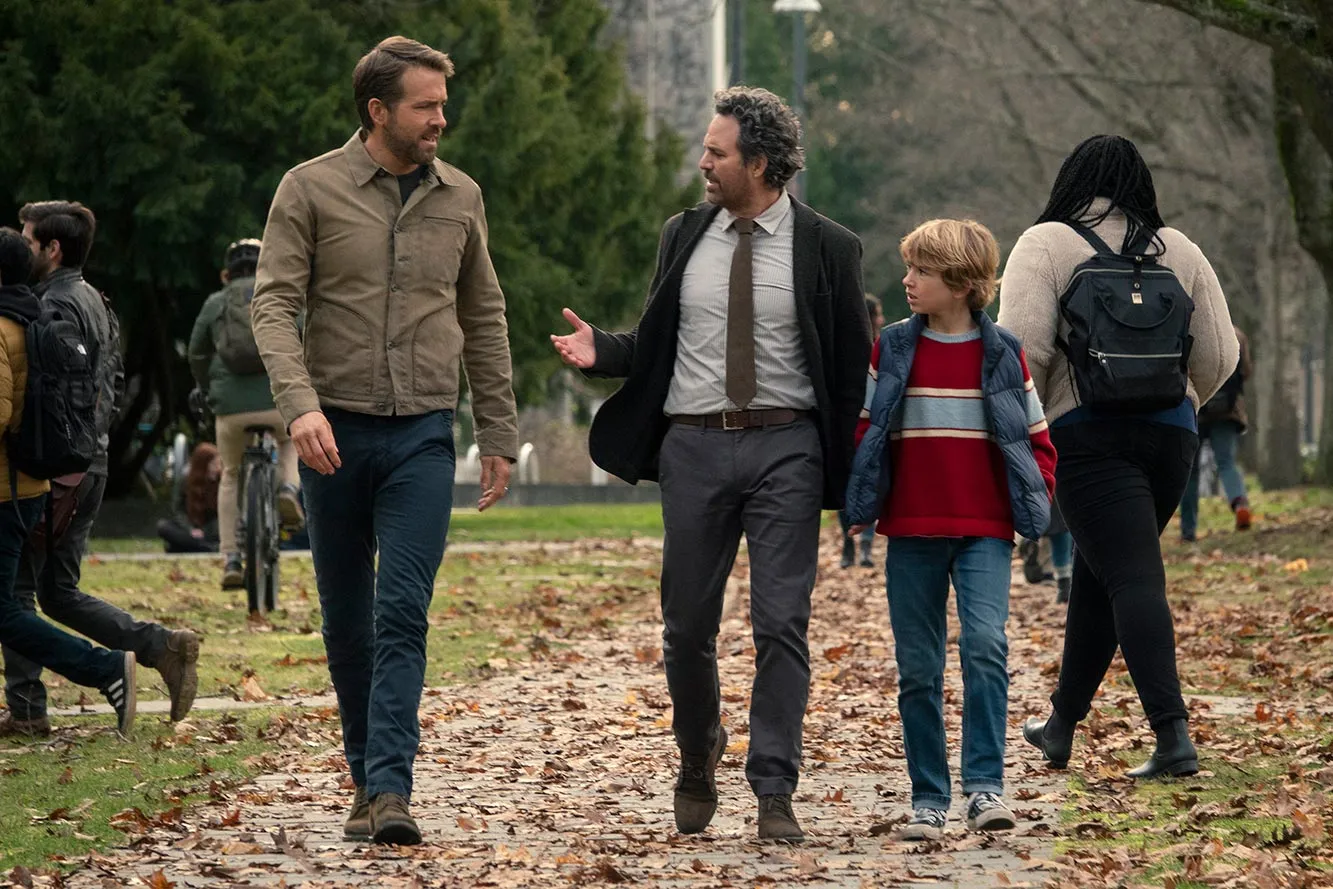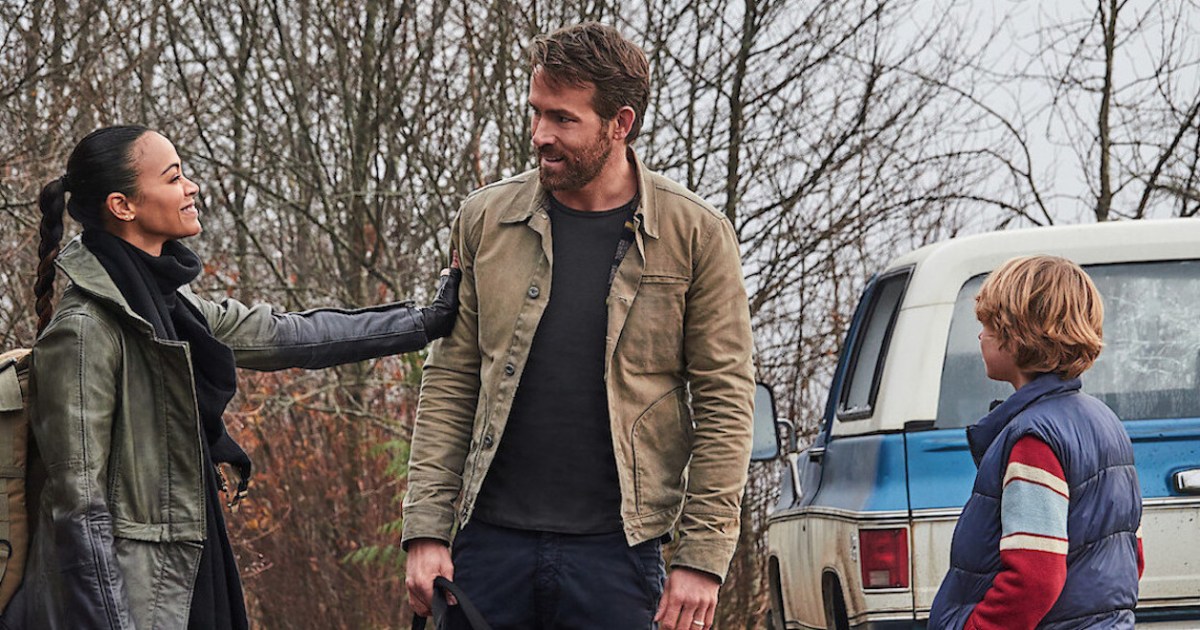The Time Travel and Ending of ‘The Adam Project’ Explained
Just some wibbly wobbly timey wimey stuff.

Ryan Reynolds’ latest film, The Adam Project, was released on Netflix this week, and it’s such a fun and touching time travel adventure. Directed by Shawn Levy, the film boasts an all-star cast including Reynolds, Jennifer Garner, Zoe Saldaña, Mark Ruffalo, and Catherine Keener. There’s also a breakout performance from 13-year-old Walker Scobell, who channeled Reynolds exceptionally well in his role.
The plot follows Adam Reed (Reynolds), a time traveler from 2050, headed to 2018 to save his wife. However, he mistakenly lands himself in 2022 and meets the mouthy 12-year-old version of himself (Scobell). His younger self is struggling after losing his father in a car accident. Badly injured, Reed reluctantly accepts his younger self’s help. But their mission changes from saving Reed’s wife, to saving the whole world (by ensuring Reed’s father never invents time travel).
While the film has been praised for its performances, visuals, and premise, some viewers may be confused by the ending. This is a pretty natural occurrence when it comes to films that tackle time travel. Nearly every film from Avengers: Endgame to Predestination has its own set of time travel rules. The Adam Project is no exception. Obviously, *spoilers ahead* for The Adam Project.
How time travel works in The Adam Project
The Adam Project takes place across 3 different time periods: 2022, 2018, and 2050. In 2022, future Reed quickly relays the first rules of time travel to his younger self. Naturally, young Reed asks the question the audience is wondering, why doesn’t the older Reed remember meeting his past self, and therefore, why doesn’t he know everything that happens? The older Reed explains this is because of ‘fixed time.’ Essentially, every person has just one place in time where they belong on a quantum level. Older Reed’s fixed time is 2050, thus, his memories won’t reform and reconcile until he returns to his fixed time. It’s a pretty nifty (and surprisingly simple) explanation. When older Reed gets to his own time period, then time (and his memories) will change. Until then, he’s in the dark like everyone else.
Older Reed then fills in the younger Reed on what’s happening in the future, and how time travel plays into it. Reed crash-landed in 2022 because he was being pursued by Maya Sorian (Keener), the leader in the future (which has become a dystopian, apocalyptic nightmare). Life in 2050 is described as, kind of like the world in Terminator, but even that world would be 2050 “on a good day.”
Even with things as bad as they are, at first, older Reed has no intention of correcting the future—he was attempting to get to 2018, because his wife, Laura (Saldaña), time traveled there, and he was told she died in a crash. He doesn’t believe it though. And he’s proved right when Laura finds the older and younger Reeds in 2022 (after Sorian attacks them) and reveals she got stuck in the past after escaping an assassination attempt in 2018.
Here’s where it gets slightly more complicated. There’s a general code of ethics with time travel in the world of this film. You’re not supposed to significantly change the future. But what Laura found out (and the reason Sorian tried to murder her) is that Sorian changed the fixed timeline, well before the events of the movie, and to her own personal gain. See, Reed’s dad, Louis (Mark Ruffalo), came up with the technology that allowed time travel in the past. Sorian was his business partner, and in the original timeline, the tech was never used again after Louis’ death. But Sorian went back in time to 2018 and gave her younger self the information to alter the course of history. This led to her controlling time travel (and the world) in 2050. Laura now knows that if they stop this event, they can reset the future to how it was supposed to be. She urges the Reeds to make a time jump into 2018 to stop Sorian. It will mean she and Reynolds never meet (they met as time travel pilots in school), but it’s a sacrifice they’ll have to make.

How does The Adam Project end?
Back in 2022, Laura is killed by Sorian while giving the Reeds time to escape to 2018. The Reeds then meet their father, Louis, before his death. Their goal is to destroy his time travel tech, thus, making Sorian’s dystopian future impossible. They aren’t supposed to tell their father who they are (time travel ethics and all that), but he immediately knows Reynolds is his adult son, and they tell him the whole deal. So much for not making waves.
Louis initially refuses to help, but eventually, has a change of heart. The Reeds and Louis go to Sorian Technology to destroy a hard drive that’s vital for Louis’ particle accelerator. There, they are confronted by the older and younger Sorians and their henchmen. A massive battle leads to the particle accelerator being damaged, overloading, and releasing a massive magnetic field. When older Sorian attempts to shoot Louis, the magnetic field changes the direction of the bullet, killing younger Sorian instead. The older Sorian disappears. And Louis and the Reeds escape the building before the particle accelerator explodes. With Sorian dead, and the particle accelerator destroyed, time travel is never created, and the grim future of 2050 is unwound.
The Adam’s Project ending explained
While time travel is never created, the Reeds don’t alter other aspects of the timeline. Louis is adamant that the Reeds don’t tell him how he died, as that could potentially save him. Hence, Louis does still die in a car accident and is still deceased when the Reeds return to their timelines. However, he seems able to accept his passing with peacefulness and acceptance. He has one last moment with both versions of his sons—where they play catch. It’s pretty adorable.
But here’s where it gets a little dicey, rule-wise. Time has been reset for both Adam Reeds. Time travel was never invented, and therefore, they never could have met or had the whole adventure. But before they go back to their futures, older Adam urges his younger self to hold something inside of him, even though he won’t remember. Be kinder to their mother or he’ll regret it later. So, while the Reeds have learned to let go of their bitterness over their father’s death in the movie, they also seem to carry a piece of that when they go back to their timelines. Instead of just being snarky to his mother, like he was in the beginning of the movie, we see younger Reed hug his overwhelmed and grieving mother at the end. We’re left to understand that the events left a trace of themselves in younger Reed on a cosmic level, even though technically, he should have no knowledge of them.
The final scene of the film occurs years after the young Reed’s adventure. Older Reed is in college and he meets Laura, in the exact same manner he had described to his younger self in 2022. This last scene is meant to confirm that even though time travel doesn’t exist, and the future is altered, Reed and Laura do still meet. The two were always meant to be together, regardless of time travel, ending the film on a sweet note. Perhaps it isn’t just timelines that are fixed in this universe, maybe, like in the Doctor Who rules, some momentous events and feelings can never change.
(featured image: Netflix)
Have a tip we should know? tips@themarysue.com